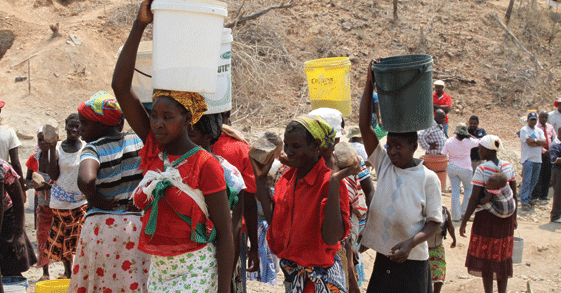
Despite its status as one of the poorest districts, Binga could be a sleeping giant waiting to rise if the natural resources, which it is endowed with, are tapped for the benefit of the community and this could easily spur it into moving from being a basket case to an economic hub. Richard Muponde Senior Reporter
The district has been relying on the benevolence of non-governmental organisations (NGOs) for its development, but this has not helped it much, as it continues to wallow in abject poverty.
Binga’s underdevelopment borders on marginalisation by the government, despite the district being endowed with vast natural resources, which if exploited could kick start economic and sustainable growth.
Among resources found in Binga are coal, timber, fish, wildlife, which include the Big five in the Chizarira National Park, vast virgin fertile land, which could be transformed into an agricultural green belt along the Zambezi River. If all these resources were tapped, no doubt, Binga could become one of the most developed districts in the country.
However, the situation in Binga is different. It is the most underdeveloped district in the country, relying mostly on donors for food, water and other social developmental projects.
Hunger and starvation stalk Binga villagers, to the extent that some are even selling farming inputs to buy food. The marginalisation of Binga has seen some unscrupulous NGOs making money using Binga as a reason to get donor funds – money which is not channelled to intended beneficiaries, but allegedly converted to other uses.
With the government seemingly uninterested in Binga, the district is left to its devices and at the mercy of NGOs.
However, with projects being undertaken through funding from the USAid and the World Food Programme (WFP) with their implementing agents such as LEAD, Zubo Trust, Hilfswerk Austria International, there is hope that Binga might arise from its slumber.
- Chamisa under fire over US$120K donation
- Mavhunga puts DeMbare into Chibuku quarterfinals
- Pension funds bet on Cabora Bassa oilfields
- Councils defy govt fire tender directive
Keep Reading
The vision of Binga becoming a successful district from the use of its natural resources was shared by Abbigal Muleya, a women’s empowerment activist and a Zubo Trust official.
Muleya – who received a special mention from United States President Barack Obama at the Young African Leaders’ Initiative summit when he addressed 500 fellows in Washington DC in July – in an interview of Friday, said the sun was rising for Binga.
“Binga is a place of opportunities,” she said optimistically. “It has virgin land and a proper utilisation of the resources will see our community develop.” Muleya said the community was facing the prospect of a new dawn, although sometimes it seemed the pace of development was slow.
WFP deputy country director Abdurrahim Siddiqui said his organisation had moved from focusing on food aid in Binga to help villagers embark on sustainable programmes and add value to their natural resources to develop their economy. “The whole process is long term,” he said.
“We are working on addressing food security in Binga and the country as whole. We are helping the villagers to build dams to ease shortages of water and that they embark on irrigation schemes to turn this area into a green belt.” Siddiqui said they had not abandoned food aid, but would only intervene when there’s a drought.
“We have the capacity to respond to relief where it’s needed, but at the same time focus on making communities self-reliant,” he explained. USAid Zimbabwe Mission director, Melissa Williams, whose organisation has funded a number of development programmes in Binga, said they would continue funding sustainable programmes in Binga.
“We will continue with these programmes so that villagers will be able to fight trauma shocks when they come, like drought,” she said.
“We are really looking at these programmes very seriously so that they become a daily part of lives.”
USAid has funded the harvesting of a medicinal plant in Binga, Strophanthus known by locals as tjotjokulumpalumpa used to prevent heart failure. Binga villagers, who are part of the project, have won an international contract to supply the medicinal plant to international pharmaceuticals, a potential million dollar deal.
They are working with an organisation called KAITE Trust, which has also helped villagers farm Rosella, which is used to make tea, jelly and jam and is the second best tea on the world market besides black tea.
If such value addition programmes are undertaken by all NGOs which are in their numbers in Binga, the district could prosper and move away from the donor dependency and also shed the basket case tag. With all the untapped resources, Binga is a sleeping economic giant waiting to awaken from a deep slumber.










